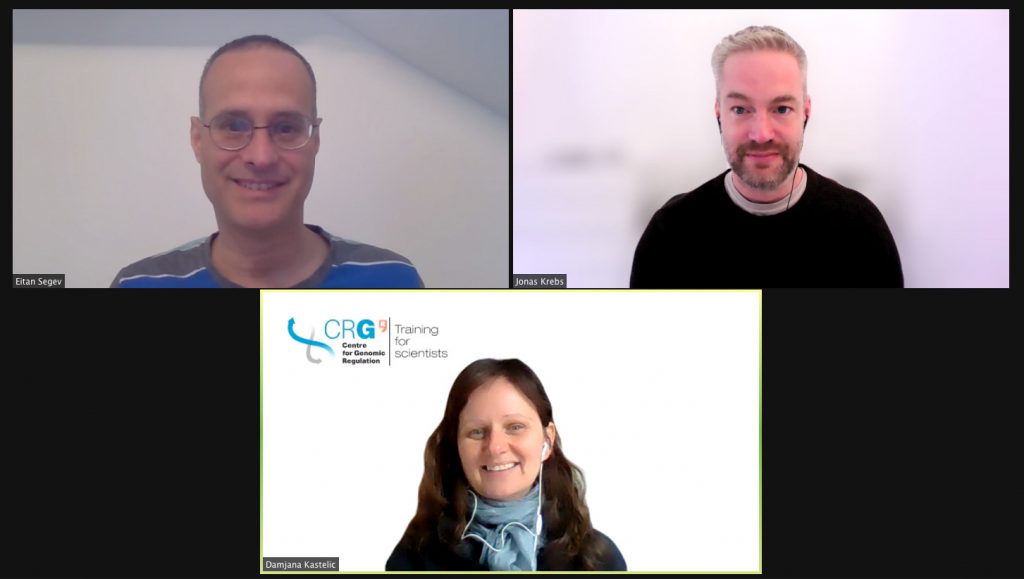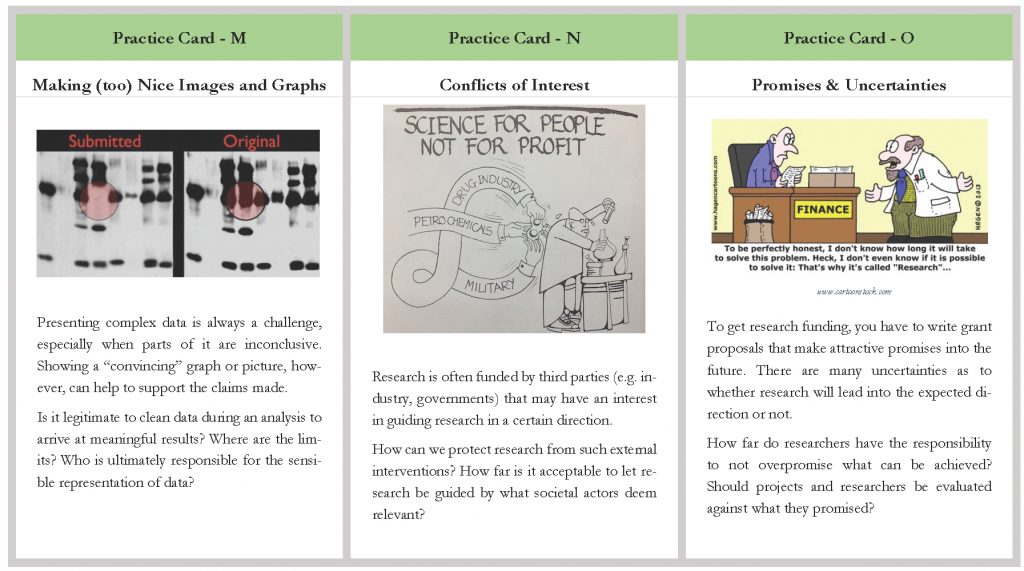Apr 9, 2021 · 7min read
Introduction
The Covid-19 world pandemic is affecting many aspects of our lives. Like many other fields, the scientific world, specifically the training of future scientists, had to find ways to cope with the new situation. The EU Marie Skłodowska-Curie Actions (MSCA) Innovative Training Networks (ITNs) rely on a series of training events that provide an in-depth view on specific topics that are essential for the career development of the recruited Early Stage Researchers (ESRs). The mobility of scientists halted during the past months, as well as with them, in many parts, the scientific projects themselves.
But the pandemic also created new connections and brought together two ITNs that closely collaborated to bring quality content to their ESRs, despite social distancing and mobility restrictions. The networks used Zoom and other online tools to connect students and train them in topics like communication, scientific writing and ethical issues in research and in publishing. Today, we are having with us the two network managers, Jonas Krebs, the manager of ChromDesign, and Eitan Segev, the manager of EpiSyStem, being interviewed by Damjana Kastelic, training coordinator at CRG, who organised a couple of courses with them together.

Damjana: Hi guys, what are your networks all about?
Jonas: The main aim of ChromDesign is to characterise the impact of the three-dimensional (3D) chromatin organisation on gene regulation during cellular differentiation and in several human disorders. Besides, the communication of complex scientific topics to society using design plays a central role, which explains the “Design” in the acronym of the project. These goals will be achieved thanks to the dedicated work of our 13 ESRs, who are trained and supervised in 11 different research groups spread all over Europe. ChromDesign is coordinated by Luciano Di Croce at the Centre for Genomic Regulation (CRG) in Barcelona, where also 4 ESRs are located. The other ESRs do their research in France, Belgium, Germany, Italy and Denmark.
Eitan: Likewise, our network, EpiSyStem, focuses on chromatin as well. EpiSyStem, which stands for Epigenetics and Systems Biology of Stem Cells and Reprogramming, is coordinated by Prof Eran Meshorer at the Hebrew University in Jerusalem. Our research combines chromatin biology in stem cells, early embryos and reprogramming, including the modelling of human neurological, chromatin-related diseases with bioinformatics, epigenetics/epigenomics, and systems biology at the population and single-cell / single embryo level. We have 12 ESRs in Israel, Italy, France, Belgium, Germany and the Netherlands.

Damjana: In general, how did your training programme look like before the pandemic?
Eitan: The training programmes of ITNs are usually built around the scientific discipline of the network. The idea is to provide the ESRs with a broader perspective on the field and on science in general. In addition to the field’s specific topics, scientific and technological advances, we also equip our ESRs with so-called transferable skills like science communication, writing and research integrity. Such provided skills and tools will help them become more responsible and better equipped scientists.
Damjana: How did the pandemic change your plans?
Eitan: As for everyone else, the pandemic caught us by surprise, and we had to cancel all our in-person training events and meetings planned for the year. One of the critical foundations of ITNs is the mobility of the ESRs to other members in the network to acquire new skills relevant for their research and to gain experience in other sectors. Of course, it was not possible during the pandemic. Moreover, ESRs were stuck in other countries for months, unable to return to their institutions and continue their research.
Jonas: At first, we all thought that within a couple of months, we would be able to resume our activities, and our first strategy was to just postpone the dates of our next consortium meetings and training events. But, soon we realised that we had to find other ways to bring knowledge and other contents to the ESRs. Eitan and I encountered the same difficulties. We both had to be creative in delivering some valuable training to the ESRs via Zoom, Moodle or other online tools.
Damjana: So how did you then start collaborating?
Jonas: We did not know each other when our projects started, but our networks are in very similar scientific disciplines, and we had planned comparable training courses. Besides, three PIs participate in both our networks. One of them introduced us, I think in mid-2020, to announce an event that Eitan organised; the linkage was natural and smooth. After this introduction, we started discussions about future collaborations, and Eitan invited our ChromDesign fellows to a couple of smaller online training events that he had already planned with EpiSyStem, including how to efficiently deliver a message to your audience and important points in writing a scientific paper.
Eitan: We were very enthusiastic about the collaboration and the engagement of the ESRs. Jonas came with the idea of a “tour de Zoom” event in which the two networks would meet and get to know each other on the personal and professional levels. It was a huge success: both coordinators gave a brief overview of the projects, followed by some ice-breaking activities with the ESRs. The idea was that with personal acquaintances, they would be able to find colleagues with similar interests as well as similar struggles, and dilemmas. We then also discussed topics for further joint courses. Jonas and I agreed that research integrity and ethics were very suitable ones for both ITNs.
Damjana: How did you structure the ethics course?
Jonas: I saw this virtual collaboration with Eitan and EpiSyStem as a great opportunity to offer a more comprehensive training in ethics, which we had scheduled anyhow in our ITN. In past projects, with intense in-person training schools, ethics was often a side topic that came up short and was added to fill a gap in the agenda. There was never enough time to actively engage ESRs in discussions and convey the importance and relevance of ethical issues in research.
Eitan: I agree. We also used to see that in our daily routine as scientists. We have a set of rules we need to follow to get some ethical approvals for our research. However, we rarely stop to think what is the rationale behind it. Is it a product of theoretical political discussions or is it derived from the history of science? The evolution of those rules and international treaties is highly important in educating the next generation of scientists and decision-makers in terms of maintaining human rights. In future ITNs, we will surely give a unique focus to ethics education within our training events.
Jonas: We then decided to divide it into two separate parts. The first one dealt with research integrity in publishing and was provided by the EMBO journal editors and trainers Dr Elisabetta Argenzio and Dr Ieva Gailite, who encounter such matters daily. The instructors discussed with the ESRs good practices in the collection, analysis and reporting of data to ensure transparency and reproducibility, both in the lab and when sharing results with others in the field. Confined with Zoom technology, the sessions were interactive and lively. For example, all ESRs really liked the challenge of identifying intended or unintended manipulations in pictures of manuscripts sent to EMBO in the past.
Eitan: The other course part was dedicated to ethics and data management in research. We hired Dr Luca Marelli from KU Leuven and built together with him a 4-module course covering theories of ethics, practice, policy and current issues in the public debate. The course started with the “Imagine RRI” card game (Felt et al, 2018), which, in a very playful manner, facilitated discussions about the ESRs’ views on their responsibility as researchers to society. The second module gave an overview on the emergence of research ethics and its changing goals, priorities, and principles over time. We discussed for example the Nuremberg Code (1947) and Helsinki Declaration as key documents in research ethics. In the third module ESRs analysed and discussed current challenges in data access for research, and issues of data governance, incl. the controversial role of big tech companies in acquiring and managing personal heath data. The course ended with the award documentary “Human nature“, followed by a joint discussion with all our ESRs and experts from our networks about ethical implications of CRISPR-Cas9 technology on society, and its ambivalent potential to eliminate certain diseases but be misused, for example for human enhancement. The CRG Moodle platform helped a lot in bringing some background material to the ESRs. As with the other course, also in this one, the sessions were interactive and included live interactions, group work and discussions.

Damjana: How was the course perceived by the ESRs?
Jonas: Well, quite differently (laughing). I think the course gave a great overview and there was a bit for everybody. It was only a big challenge that the course series in that comprehensive form was a pilot for all of us, and the content did not exist from previous courses. We also used the Moodle platform for the first time in our ITNs. On the one hand, we had more flexibility with providing content, such as pre-recorded lectures that did not have to be watched in a live zoom meeting. This was a significant advantage. But on the other hand, since the content was developed as work-in-progress, it was not easy to anticipate the workload for the ESRs, which was perceived very differently by them.
Eitan: Also, regarding the content itself, we received ambivalent feedback. While some ESRs did not perceive the content as relevant for their research projects, others enjoyed the sessions. We had some debate about it within the group. In my opinion, the fact that they are now aware of science ethical debate’s evolution, the solutions and the motivation behind it, is a great added value for them. Besides, the general idea behind the Marie-Curie ITNs, is to expose the students to topics that are not in their core field of research but elementary to their career as researchers. Ethics is definitely one of those issues.
Jonas: In the end, each course is also a learning experience for us, project managers. And this feedback helps us a lot to improve courses the next time. The exchange with other project managers and collaborations with other ITNs is very helpful to extend one’s own horizon.
Eitan: I believe that they will take it with them into their future career, whatever it is going to be. I regret that many scientists are not aware of those issues, and every now and then, we hear of malpractice of ethics. For me, it is one of the most fundamental training this network can provide.
Damjana: What comes next?
Eitan: Let’s hope we can soon move back to in-person meetings and training. But we also learned that virtual events can offer new ways of interactions and collaborations that would not be possible in person. I am sure that with or without the Covid-19 restrictions, we will do other virtual events. Surely, we will try to find other opportunities to collaborate and organise at least one more joint event in the framework of our ITNs.
Jonas: Besides, Eitan and I plan to create a virtual working group of ITN project managers to further promote the networking between networks and inspire each other by all the knowledge and good practice, which is already out there.